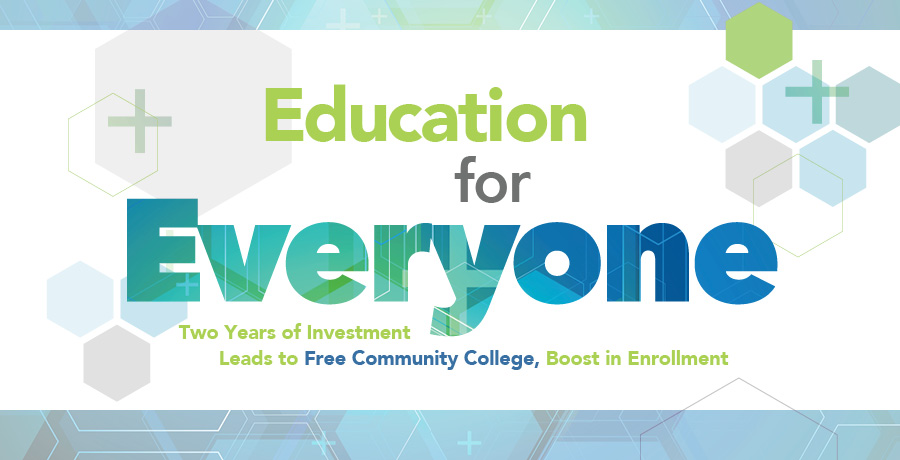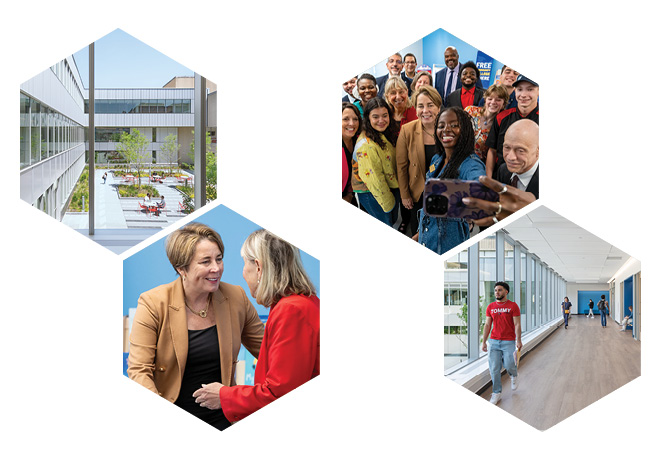
Two Years of Investment Leads to Free Community College, Boost in Enrollment
 On a brilliant October day this fall, Massachusetts Governor Maura Healey and a host of state leaders gathered in MassBay Community College’s Framingham Campus lobby to celebrate MassEducate, the state’s newest and most expansive free community college program. The event marked the culmination of more than two years of progress toward making college accessible: first through the MassReconnect program in 2023, which made community college free to qualified residents 25 and over, and now through MassEducate, which extends free tuition to all who qualify regardless of age.
On a brilliant October day this fall, Massachusetts Governor Maura Healey and a host of state leaders gathered in MassBay Community College’s Framingham Campus lobby to celebrate MassEducate, the state’s newest and most expansive free community college program. The event marked the culmination of more than two years of progress toward making college accessible: first through the MassReconnect program in 2023, which made community college free to qualified residents 25 and over, and now through MassEducate, which extends free tuition to all who qualify regardless of age.
-BHCC President Pam Eddinger
We knew that MassReconnect would be transformative for thousands of students, for our amazing community colleges, and for our economy,” Healey told the crowd of educators and students gathered that day. “Massachusetts’ community colleges are economic drivers, helping students move ahead in their careers and meeting the needs of our employers.”
Since the start of free community college programs, enrollment at the commonwealth’s community colleges has grown almost 10 percent each year—a reversal of a nearly decade-long trend of declining enrollment. Due to the expanded access, more than a thousand new students have come through the doors of Bunker Hill Community College.
As BHCC celebrates this new investment in education and workforce opportunity, the college plans to ensure that growing enrollment leads to good retention and graduation results.
“Access is only half of the equation. We must continue to make smart, impactful investments in the services and people that help our students succeed,” said BHCC President Pam Eddinger. “Our excellent faculty and staff, our academic and wraparound support services, our basic needs programs—they are critical to student success. I’m so grateful to our state’s visionary leadership for putting the community colleges front and center.”

Matching Economic Needs
When MassReconnect launched in 2023, Massachusetts joined a growing list of states offering some form of free community college. According to the advocacy group College Promise, 337 communities in 47 states offer free college programs, and 31 states have state-wide programs.
In Massachusetts, the City of Boston established the first free community college program in 2016, providing three years of tuition and fees to Boston residents at BHCC and neighboring community colleges. That program has since expanded to include a pilot program at Mass College of Art and Design to support students seeking a bachelor’s degree.
Healey announced that free community college would be a priority for her administration shortly after her election in 2022. “Tens of thousands of jobs in health care, transportation, and technology are going unfilled because the skills of our workers don’t match the demands of our economy,” she said in her 2023 inaugural address. “Let’s work with our community colleges and vocational schools, and make sure the training we offer meets the needs of our companies in every region.”
In March 2023, Healey announced the MassReconnect program at BHCC, again emphasizing the program’s impact on workforce development.
“Workforce shortages have impacted nearly all sectors of our economy, but we have an incredible opportunity before us to train the next generation of workers and increase opportunities for all,” Healey said. “More students than ever before will be able to advance or complete their educations and set themselves up for a successful career in in-demand industries like healthcare, engineering, advanced manufacturing and tech.”
When MassReconnect became law later that year, it was joined by an additional initiative, the Tuition Equity Law. The companion legislation made free tuition available to qualified undocumented residents of Massachusetts, broadening further the source of talent that would help fill workforce demands. Across the commonwealth, community college enrollments shot upward for the first time in years.
In 2024, Massachusetts Senate President Karen Spilka carried the free community college torch further by expanding it to include all residents without a college degree. The program, now known as MassEducate, was signed into law by Healey in the summer of 2024.
“Today, we shift conversations about college from ‘I wish’ to ‘I will,’ for thousands of students and families in Massachusetts,” said Spilka, announcing the program. “We are investing in talent that is right here at home and opening the workforce floodgates to employers who are starved for graduates, so Massachusetts keeps the competitive edge that we pride ourselves on.”
Reversing Enrollment Trends
MassReconnect and MassEducate have initiated an unprecedented period of growth for Massachusetts Community Colleges, signaling the success of these programs and the need for sustained investments in public higher education.
Between fall 2022 and fall 2023, the 15 community colleges in our commonwealth saw enrollment growth of over 5,000 students, an 8 percent increase. BHCC accounted for about 20 percent of this overall growth. The infusion of new students reversed a trend of enrollment decline across community colleges: in the fall of 2014, the system had more than 96,000 students, and by the fall of 2022, that number had declined to around 62,000.
Explanations for the almost decade-long drop in enrollment abound: a strong, jobs-generating economy over much of that period kept prospective students in the workforce instead of the classroom; an approaching “demographic cliff” meant an ever-attenuating pool of high school graduates; and the rise of short-term workforce development programs that do not carry academic credit—particularly over the last four years.
Whatever the reason, free community college has helped Massachusetts turn the corner and brought students back to campus.
One Student’s Story
Erik Peguro is one of those students who entered BHCC because of free tuition. The 18-year-old Dorchester resident graduated in 2023 from Edward Brooke High School in Boston but hadn’t planned to go to college right away, partly because of his family’s lack of ability to pay.
Peguro spoke to the Christian Science Monitor about why he chose BHCC and how free community college shaped his decision to study engineering and play baseball. “Money was a big concern going into college, and I was considering a gap year ... I want to set myself up where I can have a future in four years. So, this is a huge opportunity for me.”
For Peguro and students like him, free community college made it easy to start their higher education journey. However, state and college leaders say additional investment and energy are needed to help students continue to have success and eventually graduate or transfer to another institution of higher learning.
Game Changer
Massachusetts Association of Community Colleges Executive Director Nate MacKinnon has called free community college a game-changer for families. He has also cited resources like SUCCESS funding, which supports wraparound services for students, and investments in recruiting and retaining quality faculty and staff as critical factors in making it work.
“If you think about the investment for free community college as being the $117 million combined that the state put into it, that’s an access program,” MacKinnon told State House News this fall. “So, to have an access program without a quality completion program is not a great investment strategy for the state in the long run.”
As we work towards ensuring the long-term success of free community college, BHCC and the state’s other community colleges will continue to be the gateway to higher education and upward economic mobility in the commonwealth. According to the U.S. Chamber of Commerce, there are only 42 available workers for every 100 open jobs in Massachusetts. Our state needs every bit of investment it can muster.
“When you think about how we provide an on-ramp for the next generation of workers,” said President Eddinger, “community colleges are the linchpin.”
-Massachusetts Senate President Karen Spilka

